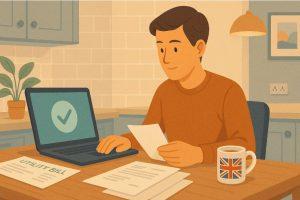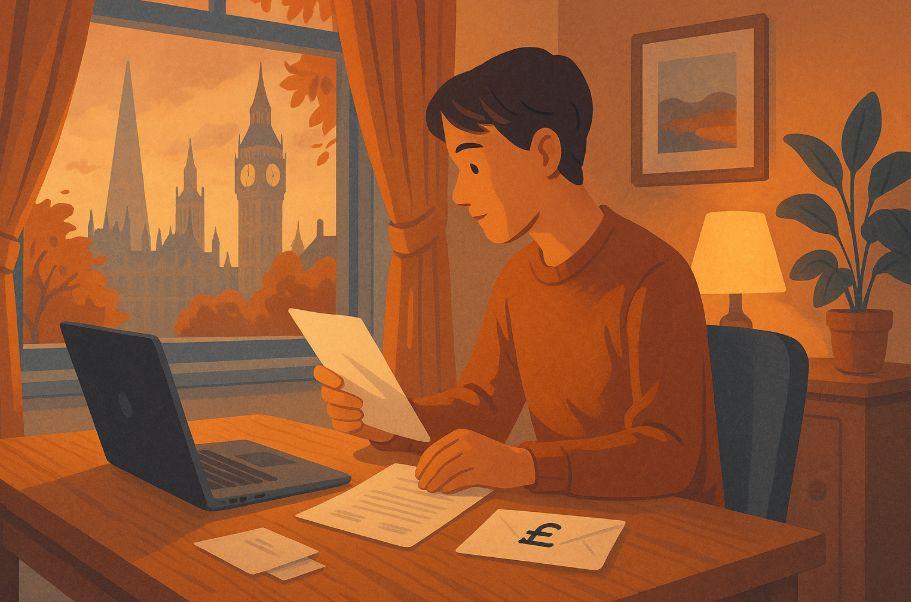In recent years, the UK government has introduced a series of financial support packages to ease the pressure of rising energy costs, especially for households facing economic challenges. One of the most talked-about initiatives is the £150 Energy Bill Rebate, aimed at helping eligible residents manage their energy expenses. While millions across the UK have benefitted from this rebate, many people particularly in London are still uncertain whether they’ve received confirmation of the payment or missed out altogether.
This article explains the essentials of the £150 energy bill confirmation process, who qualifies, how to check your status, and what steps to take if you believe you’ve been overlooked.
What Is the £150 Energy Bill Confirmation in the UK?

The £150 energy rebate is part of a wider Council Tax Rebate Scheme introduced by the UK government. Its primary goal is to reduce the financial burden on households during the ongoing cost-of-living crisis. The rebate was designed not as a discount on your energy bill directly, but as a one-off payment provided by local councils to qualifying households.
Instead of being automatically applied by energy suppliers, the rebate is handled by local authorities and sent directly to residents who meet specific criteria. This initiative is entirely non-repayable and is considered a grant, meaning you don’t need to return it or report it as taxable income. In many cases, it simply appears as a £150 payment from your local council.
Who Is Eligible for the £150 Energy Rebate in London and the UK?
Eligibility for the rebate primarily revolves around your Council Tax band. Households in bands A through D were automatically included in the scheme, as long as the property was occupied and not empty on the designated qualifying date, which was typically set in April 2022. People living in shared accommodations, such as HMOs or student housing, often didn’t qualify unless special arrangements were in place.
Additionally, individuals on certain benefits or with low incomes may have qualified under a separate discretionary scheme run by their local council. These discretionary funds were especially important for people who didn’t fall within the standard eligibility criteria but still faced financial hardship.
How Do You Confirm Receipt of the £150 Energy Bill Support?
If you’re unsure whether you received the payment, there are a few simple ways to find out. First, review your bank statements for a £150 credit from your local council or a note indicating “Council Tax Rebate” or “Energy Rebate.” Most councils processed these payments between April and September 2022, with follow-ups continuing into early 2023.
If you didn’t receive a direct deposit, your council might have sent a letter or email to confirm eligibility and provide instructions for claiming manually. Councils also offered online portals where residents could log in and check their rebate status. If all else fails, contacting your local authority by phone or email remains the most effective method for confirming whether the payment was sent, delayed, or rejected.
When Was the £150 Energy Rebate Sent Out and What’s the Timeline?
 The majority of payments were distributed in mid-2022, particularly to households that paid their Council Tax via direct debit. These cases were processed automatically and quickly. For residents who didn’t pay by direct debit, the process was slower and often required manual application through the local council’s website or a physical form.
The majority of payments were distributed in mid-2022, particularly to households that paid their Council Tax via direct debit. These cases were processed automatically and quickly. For residents who didn’t pay by direct debit, the process was slower and often required manual application through the local council’s website or a physical form.
While most payments were completed by the end of 2022, some discretionary fund disbursements continued into 2023 and even early 2025, particularly for those who encountered issues or missed the initial deadline. Councils operated at different speeds, so the exact timeline varied depending on where you live.
Why Haven’t Some Households Received the £150 Energy Rebate Yet?
Several reasons could explain why a household hasn’t received the rebate. One of the most common issues is the absence of a direct debit setup for Council Tax payments. Those who paid manually or through other methods often had to apply separately, and not everyone was aware of this requirement.
In other cases, payment information may have been outdated or incorrect, leading to delays or failed transfers. Some councils also struggled with backlogs or system errors that postponed processing. Additionally, if your property changed hands around the qualifying date, or if you moved in shortly after, there may have been confusion about eligibility.
Finally, some households simply missed the claim deadline. While councils made efforts to contact eligible residents, not all communications were successfully delivered or understood. In such cases, the money may still be held by the council, pending further verification.
How Can You Contact Your Local Council for Energy Bill Confirmation?
Reaching out to your local council is the best way to clarify your situation. Every council has a dedicated support team that handles Council Tax and energy support schemes. If you’re in London, for example, you can search for your local borough’s official website through the GOV.UK postcode finder.
Once on your council’s website, you’ll often find a section dedicated to energy rebate information. Here, you can log into your Council Tax account, check messages, or fill out an enquiry form. Be prepared to provide details such as your Council Tax reference number, property address, and personal information to verify your identity. In many cases, council staff can check your eligibility and payment status on the spot.
Can You Reapply or Claim a Missing £150 Energy Rebate?
 If you believe you were eligible but never received the rebate, it may still be possible to claim it, depending on your council’s current policies. While the official application windows have closed in many areas, some local authorities have extended discretionary support into 2025.
If you believe you were eligible but never received the rebate, it may still be possible to claim it, depending on your council’s current policies. While the official application windows have closed in many areas, some local authorities have extended discretionary support into 2025.
In these cases, councils may allow late applications, particularly for those who encountered technical issues, were unaware of the scheme, or experienced financial hardship. It’s important to act quickly, as the availability of unclaimed funds is limited and handled on a first-come, first-served basis.
If your payment was rejected due to incorrect information or account details, your council may be holding the funds in reserve, waiting for you to get in touch and verify your data.
What Other Government Energy Support Is Available in 2025?
In addition to the £150 rebate, several other forms of energy-related financial support are available in 2025. One such programme is the Warm Home Discount, which offers £150 off electricity bills for eligible low-income households. Pensioners can also access the Winter Fuel Payment, which provides between £250 and £600 depending on age and household situation.
The government has continued to roll out Cost of Living Payments to those receiving benefits such as Universal Credit, Pension Credit, or income-based Jobseeker’s Allowance. These payments are automatic and do not require an application.
Furthermore, the national Energy Price Cap remains in place, ensuring that energy suppliers do not charge customers above a regulated rate per unit. While this doesn’t reduce the bill directly, it helps manage long-term affordability.
Is the £150 Energy Rebate Taxable or Affecting Benefits?
One of the most common concerns people have is whether this rebate will affect their taxes or benefits. Fortunately, the answer is no. The £150 energy rebate is not considered taxable income and does not need to be reported to HMRC or the Department for Work and Pensions.
It also has no impact on any benefits you may receive. Whether you’re on Universal Credit, Personal Independence Payment, or another form of government assistance, the rebate is entirely separate and will not influence your entitlements.
This classification as a grant, rather than income, ensures that households receive the full benefit of the support without concern for unintended financial consequences.
How Can You Stay Updated on Future Energy Bill Support in the UK?
 Staying informed is essential, especially with the constant changes in government support policies. To keep up with the latest developments, it’s a good idea to regularly visit official websites like GOV.UK or your local council’s news section. Many councils also offer newsletters or alerts for residents who want to receive timely updates via email.
Staying informed is essential, especially with the constant changes in government support policies. To keep up with the latest developments, it’s a good idea to regularly visit official websites like GOV.UK or your local council’s news section. Many councils also offer newsletters or alerts for residents who want to receive timely updates via email.
You can also follow trusted local news sources such as the London Business Magazine to stay in the loop about financial assistance programmes, energy rebates, and cost-of-living relief schemes.
Social media channels for government departments and local councils are also valuable sources of real-time information. Turning on notifications or subscribing to updates can help ensure you’re among the first to know about new or extended programmes.
Conclusion
The £150 Energy Bill Confirmation scheme has played a crucial role in helping households across the UK cope with rising utility expenses. Whether you’re living in central London or anywhere else in the country, it’s important to understand the status of this rebate, confirm whether you’ve received it, and take action if you haven’t.
If you’re still waiting for your payment or need assistance, contact your local council as soon as possible. And as government policies continue to evolve, staying informed ensures you’ll never miss the support you’re entitled to.
FAQs
Can landlords receive the rebate on behalf of tenants?
In most cases, the person responsible for paying Council Tax typically the tenant receives the rebate. Landlords are usually not eligible unless they directly pay Council Tax and meet the qualifying criteria.
Is there still time to claim the rebate in 2025?
This depends on your local council. While most deadlines passed in 2022 and 2023, some councils are still accepting late or discretionary claims.
What if I didn’t get the payment despite being eligible?
You should contact your council immediately. If they confirm eligibility and the funds are unclaimed, you may still be able to receive the payment.
How do I find my Council Tax band?
You can check your Council Tax band by visiting the Valuation Office Agency website and entering your postcode.
I moved in after April 2022. Am I still eligible?
Eligibility was based on the occupant as of 1 April 2022. If you moved in later, you may not qualify unless under a special exception.
What are discretionary payments?
These are additional funds provided by councils to help people who don’t meet the standard criteria but still need support. Availability varies.
Are there plans for another £150 rebate in the future?
As of now, no similar rebate has been confirmed for 2026. However, other energy support schemes may continue.








